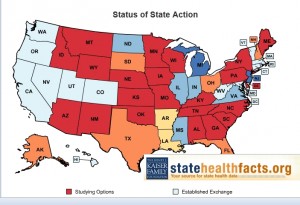What’s At Stake In Idaho’s Health Insurance Exchange Debate
It’s shaping up to be one of the main debates of the legislative session: whether Idaho will create its own health insurance exchange or reject more than $20 million in federal grant money, leaving the federal government to craft an exchange. Health insurance exchanges are a critical component of the Affordable Care Act. They’re often termed “marketplaces” because their primary function will be to allow consumers to compare health insurance options based on price and coverage.
According to this map from Kaiser State Health Facts, Idaho is one of 22 states considering its options with respect to establishing an exchange. Fourteen states have already created exchanges, including neighboring states Utah, Nevada, Oregon and Washington, and five more states have plans to create them. States that are still weighing what to do are running against the clock, as this Kaiser report explains. If the federal Department of Health and Human Services finds that a state has not made sufficient progress toward establishing an exchange by January of next year, the federal government will administer an exchange on those states’ behalf. Under the Affordable Care Act, exchanges must be functioning in every state by January 2014.
As Idaho weighs whether to create its own exchange, what are the stakes? In an interview with StateImpact Idaho last month, Rep. John Rusche (D-Lewiston) said Idaho’s existing insurers would be vulnerable in a federal exchange. “Their ability to participate in a national exchange that serves 15 or 18 states would be nil,” he said. “They couldn’t sell insurance nationwide, so those companies would pretty well be out of business.” Blue Cross of Idaho and Regence BlueShield of Idaho, the state’s two largest insurers in the individual and small group market, together employ about 1,800 people in the state.
Blue Cross of Idaho’s General Counsel, Steve Tobiason, is a bit more circumspect about the risks of a federally-created exchange. In his mind, broad job losses are a possibility, but probably a remote one. He says the more pressing concern is maintaining local control, and avoiding the uncertainties that accompany a federal exchange. “If the various players can sit down and say, ‘This is how we think it ought to look,’ then you’ve got something that’s going to work for this marketplace,” Tobiason said. “This state does believe in a very free-market and independent place to do business, and there’s no guarantee that’s how it will look under a federal exchange.”
StateImpact will have more on Idaho’s health insurance exchange debate, so keep reading.


